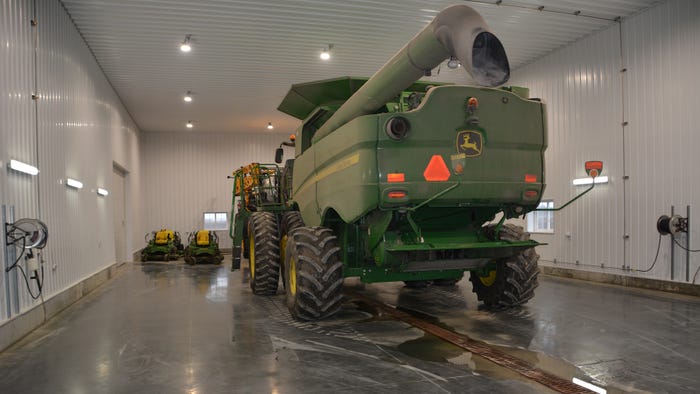
What do you want to accomplish in your farm shop? It’s one of the most important questions to ask yourself. Tim Stafford and his sons, Jordan and Jarren, Tipton, Ind., had several goals in mind when they decided to replace their existing farm shop.
They wanted more room so they could work on multiple projects at once, an office to consolidate farm business in one place outside of someone’s home and the ability to clean machinery in any weather.
Maintenance is important to them, and maintenance begins with cleaning equipment thoroughly.
“That’s why we invested in a wash bay,” Jordan says. “We wanted to clean when we wanted, and at the same time, we wanted to keep as much dirt and grime out of the main shop as possible.”
The Staffords’ farm shop, office and wash bay fit inside a 100-by-184-foot structure. The shop itself is 100 by 120 feet; the office measures 24 by 100 feet, and the wash bay is 40 by 100 feet.
The father-and-sons team did a fair amount of the work themselves, contracting with FBi Buildings Inc. to erect the shell. The entire project was spread over two years to make use of their labor and to allow them to pay for it over time.
Large wash bay
A large combine looks lonely inside the wash bay. “We wanted it large enough so that two people could wash at once,” Jarren says.
The power unit for the cleaning system is in the corner of the bay farthest from the door, next to the manifold for in-floor heating. That system is fed by lines from boilers at the opposite end of the building. Propane powers both boilers. There are three zones: one for the wash bay, one for the shop and one for the office. Eventually, a third boiler will provide in-ground heating for a concrete pad outside the shop doors and for a sidewalk to the office.
The power unit for the cleaning system sends water to two wands, each about halfway down the bay, on opposite sides. Two people can wash without interfering with each other.
A large drain takes in water quickly, keeping water from accumulating on the floor, Jarren says. Drains are made from heavy-duty material to ensure long life.
“We included a door to move smaller items from the wash bay to the shop, but we move bigger equipment in and out the main, large wash bay door,” he says.
Plenty of room
A tractor hooked to a large implement, unfolded, can sit in one area of the shop, with plenty of room left for two or more other projects. If a truck is torn down, for example, waiting on a part, it doesn’t clog up the rest of the shop, Tim says.
“We do most of our maintenance and repair work, and we wanted to have multiple projects going at the same time,” Jordan adds. “We can unfold almost every implement in the shop, and we need to keep space clear for it.”
The oil pit is in a front corner, out of the way compared to where most equipment is parked for a major repair job. It’s convenient to the storage area for all types of oil.
Work in progress
One thing the Staffords didn’t have before was a conference room. They also each have an office.
“It’s more convenient to have offices in one location, and not to have them spread out in our homes,” Tim explains. “We felt it was important to include a functional office, so we all have a place to keep our records.”
There are still several finishing touches to add to the shop complex, including installing the final boiler and organizing supplies and items not used often in the loft and in a storage room next to office. They expect to add finishing touches soon.
Read more about:
Farm ShopAbout the Author(s)
You May Also Like




